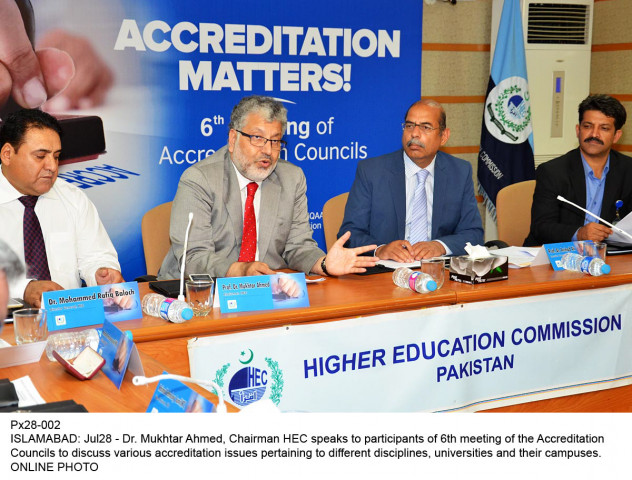Higher education sector: Joint efforts needed to address quality, governance issues
HEC holds meeting of all accreditation councils

HEC Executive Director Arshad Ali said that the HEC accorded due importance to teachers’ education as excellence in education depended on quality teachers. PHOTO: ONLINE
The HEC organised the sixth meeting of all accreditation councils on Thursday to discuss various issues pertaining to different disciplines and accreditation of universities and their sub-campuses.
The HEC Chairperson, Dr Mukhtar Ahmed, who chaired the meeting, stressed the need for close coordination and joint efforts to ensure quality in higher education.
“The two most important issues facing the higher education sector are quality and governance issues in universities. We have to put joint efforts to address these challenges,” he underlined.
Ahmed also urged the accreditation councils to avoid issuing provisional no-objection certificates (NOCs) to universities or their campuses as such practices put the future of students at risk if a university fails to meet the criteria.
He also emphasised the need for joint review of programmes by the HEC and the respective accreditation councils.
Dr Ahmed said the world was opting for virtual facilities instead of building physical structures.
He said that universities should share facilities within their departments as separate labs, libraries and other facilities for every department were not possible.
“The HEC has spent Rs225 billion on building infrastructures for the last 12 years,” the HEC chairperson said.
He directed the PMDC to ensure implementation of semester system in medical colleges.
Representatives of all accreditation councils including the Pakistan Engineering Council, the Pakistan Medical and Dental Council, the Pakistan Veterinary Council, the Pakistan Nursing Council, the Pakistan Council for Architecture and Town Planners, the Pharmacy Council of Pakistan, the Pakistan Bar Council, the Pakistan Council for Homeopathy, the National Council for Tibb, the National Agriculture Education Accreditation Council, the National Business Education Accreditation Council, the National Computing Education Accreditation Council, and the National Accreditation Council for Teacher Education attended the meeting.
It was agreed that programme ranking criteria should replace university ranking so that accuracy was ensured.
HEC charts four years BEd programme
The HEC has outlined a four-year bachelors in education (BEd) and a two-year associate degree in education.
The decision was taken at a meeting held at the HEC and attended by members of federal and provincial public service commissions and federal and provincial secretaries of higher education.
The HEC approved the teacher education roadmap (TER) as well as the national professional standards for teachers.
The regulatory body approved a four-year BEd degree with 140 to142 credit hours and a two-year associate degree in education with 68 credit hours.
HEC Executive Director Arshad Ali said that the HEC accorded due importance to teachers’ education as excellence in education depended on quality teachers.
Published in The Express Tribune, July 29th, 2016.



















COMMENTS
Comments are moderated and generally will be posted if they are on-topic and not abusive.
For more information, please see our Comments FAQ